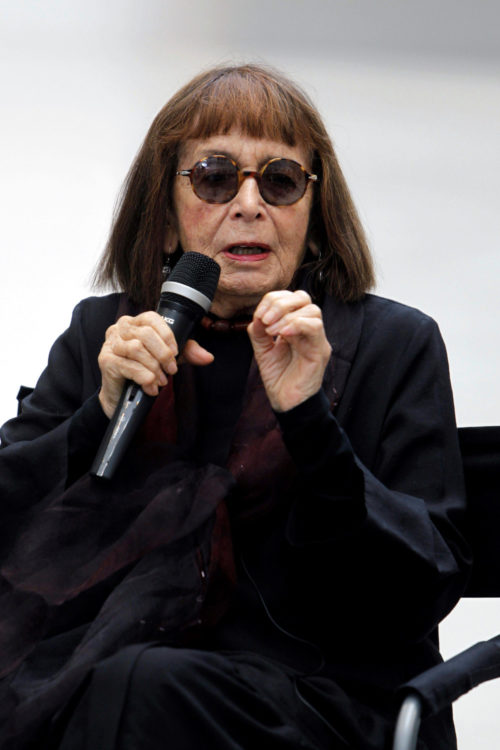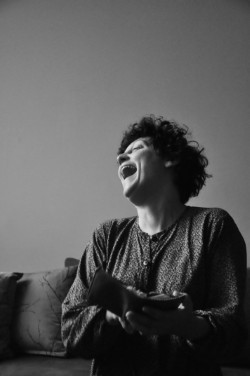Review
As part of the 2017 France-Colombia Year, the CAPC Musée d’Art Contemporain de Bordeaux presents a retrospective of the work of Beatriz González (born in 1938), a major figure of Colombian art.
González was quickly associated with pop art due to her interest in mass culture, the synthetic form of her style, her taste for bright hues, and her fondness for screen-print reproduction. However, the artist has always challenged this association, affirming that her art is “provincial” (read: “on the margins”), subversive and eminently political.
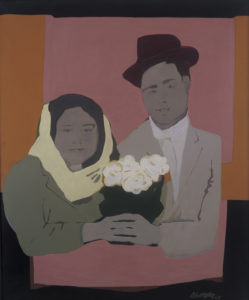
Beatriz González, Los Suicidas del Sisga No 2, 1965, oil on canvas, Courtesy of the artist and Óscar Monsalve
In 1965, the year she graduated from university, González painted what was to become a manifesto work, Los Suicidas del Sisga (The Suicides of Sisga). All the hallmarks of her artistic maturity were already present – dramatic subject, appropriation of a press clipping, palette, and formal exemplarity inspired by popular etchings – and the work sparked her exploration of the subject of social violence. One of the three versions of this painting is shown in Bordeaux, to the spectators’ great delight, in an illuminating section dedicated to the procedures used by the artist (tracing and multiplication of a single theme via various media).
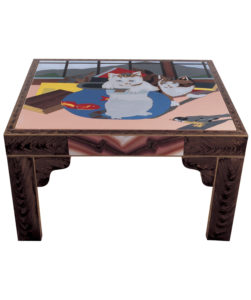
Beatriz González, Naturaleza mesa viva, 1971, enamel on metal slab on metal table, Courtesy of the artist and Laura Jiménez / Juan Rodríguez Varón
Very touched by the beauty of the advertisements and mass-marketed images from the Gráficas Molinari company (pious scenes, pin-ups, animals, landscapes, etc.), but also by the copies of classic artworks decorating Colombian interiors, González, who defines herself as an “investigator of taste”,1 integrated these elements within her work from the 1970s onwards. They are notably reproduced, not without humour, on domestic objects such as curtains, furniture (Naturaleza Mesa Viva [Plain Coffee Table], 1971), crockery (Salomé, 1973) or television sets – which occupy a large part of the nave of the CAPC.
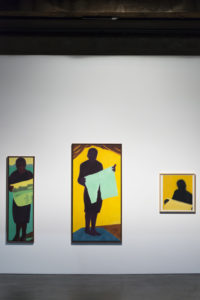
Beatriz González. Rétrospective 1965-2017, exhibition view of CAPC musée d’Art contemporain in Bordeaux, Courtesy CAPC, © Photo: Frédéric Deval, Mairie de Bordeaux
In 1985, the shock caused by the deaths of dozens of people during the hostage taking at the Palace of Justice in Bogota by the M-19 (a guerrilla movement) constituted a turning point for González. Now with a less ironic tone, she represented the main figures of the Colombian tragedy in large canvases, brought together here under a vaulted ceiling: the corrupt leaders (Los Papagayos [The Parrots], 1987), the anonymous victims of the civil war (1948-1960) (Auras Anónimas [Anonymous Auras], 2009) and those of the paramilitary and drug traffickers and, more recently, her fellow citizens deported from Venezuela by Nicolás Maduro’s government (Los Dezplazados [The Displaced], 2016). The destructuring of planes, in dark tones, effectively translates the chaos that seems to endlessly disrupt the country. While this retrospective – the first in Europe! – reveals important artwork, it is nevertheless recommended, to compensate for the lack of information made available to the public, to linger before Diego García-Moreno’s documentary screened by the CAPC, in which the artist’s voice will be heard with moving vivacity.2
Beatriz González. Rétrospective 1965-2017, from 23 November 2017 to 25 February 2018, at the CAPC Musée d’Art Contemporain (Bordeaux, France).
In the documentary by Diego García-Moreno Beatriz González ¿Por Qué Lloras Si Ya Reí? [Why Are You Crying If I’m Laughing?], 2010 (feature film, 80 minutes, Courtesy of Lamaraca Producciones, Bogota).
2
Ibid.




